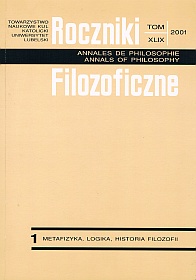Obiektywność percepcji zmysłowej
Abstrakt
There is an old problem in philosophy: the problem of how we pass from the mental theater of our representations to the external realm of concrete physical objects - from the "inner” to the "outer” . This problem arises against the background of representationalist theories of the relation between mind and its objects, theories that have taken different forms since Descartes, Kant, Helmholtz or Brentano. Representationalist theories of perception are marked by the following three features: 1. The perceiving subject is idealized. It is conceived as lying outside any context or environment and in abstraction from any goal-directed behavior. 2. Perception is seen as beginning with raw or bare sensations; then, by a process of inference or deliberation, there arise beliefs about external, physical objects. 3. Physical objects are assumed to be out there in the world, but to be inaccessible to direct experience. Our knowledge of them is indirect; it is the product of hypothesis and inference. This representationalist theory lives on in the computational theories of the mind and in doctrines of "methodological solipsism” embraced by much contemporary cognitive science. But the theory rests on a mistake. By making perception dependent on sensation, and by making sensations the direct objects of experience, it has matters exactly upside down. The paper draws on the ecological psychology of J. J. Gibson and Roger Barker in order to provide the metaphysical principles of a more adequate theory.
Copyright (c) 2001 Roczniki Filozoficzne

Utwór dostępny jest na licencji Creative Commons Uznanie autorstwa – Użycie niekomercyjne – Bez utworów zależnych 4.0 Międzynarodowe.





